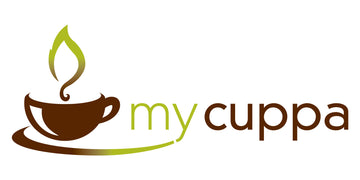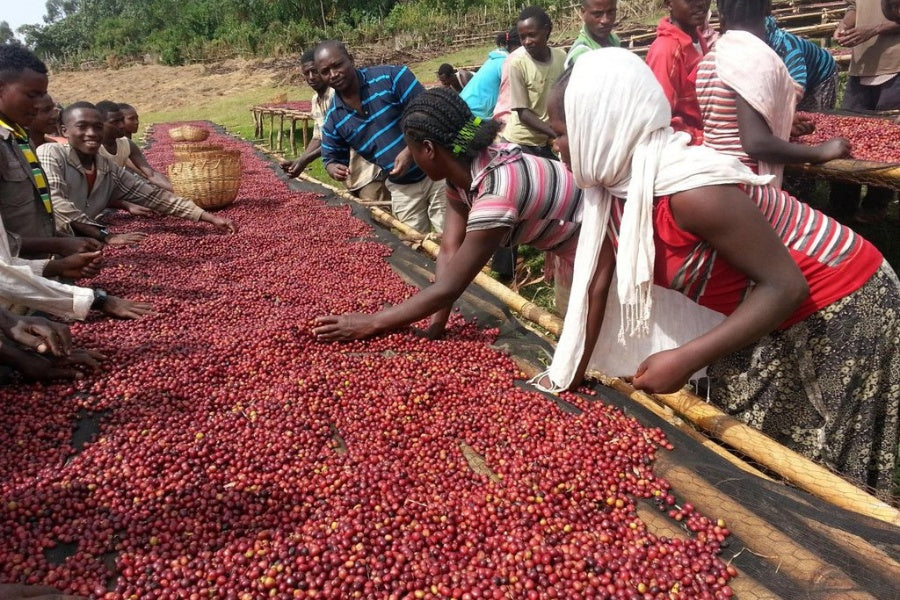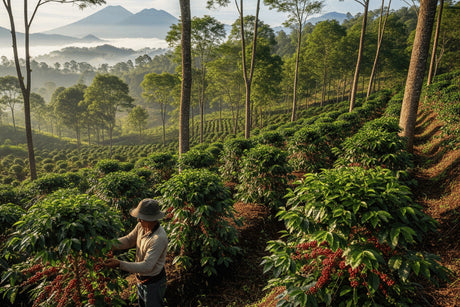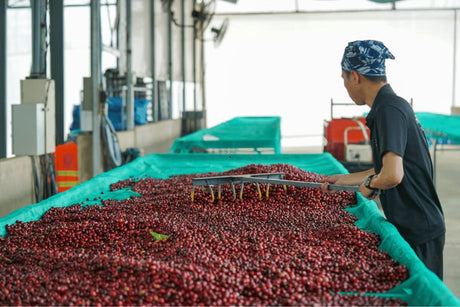“No one is entertained by economics.” — Michael Moore
mycuppa August 2018 Newsletter
It's the busiest time of the year for the coffee industry, and not because of the cooler weather. In fact, we tend to sell more coffee in Summer than in Winter (read our article below).
Many of the new crop coffees are afloat or arriving in port, and a lot of our raw green coffee holdings have run down to zero with new season arrivals flowing into the warehouse; our lab has been running flat-out testing, evaluating and tweaking for the last few weeks.
August marks a period of significant change - many single origins and all our blends will be different with new ingredients. For combinations, it's like starting over again with a blank sheet.
This month, we are doing something different, and it's exciting to introduce a new concept.
- Ethiopia Yirgacheffe FAIRTRADE Organic - a natural process coffee producing excellent floral aromatics.
- August Secret Label - a stunning coffee in every regard; the origin remains a secret, it's a cracker; get on it!
- Klasik returns - a discounted coffee with a purpose.
Did you know the price of a cup of coffee has risen just 6% in the last decade? This month's opinion piece looks at the economics of how price deflation impacts the Australian coffee market.

In July, we attempted to develop another Cleanskin but ended up empty-handed. Unfortunately, there were better times of year to try building a coffee with low holdings and new seasons about to land.
However, there is some good news, and it's far more exciting and rewarding.
While searching for some hidden jewels in July, I stumbled across a veritable mother lode.
Instead of Cleanskin, we are launching a new Secret Label Coffee for our Newsletter subscribers.
Serious wine enthusiasts will know about Kemeny's and their regular Secret Label offerings (forcing me to drink too much), so we thought that's a ripper idea and why not give it a run with some great coffee.
This month, our August Secret Label is a single-origin coffee, scoring 86 points. To put this score into perspective, less than 1% of coffees scored over 85 points.
That places our August Secret Label way above cafe grades (typically score 78 - 82), and our August Secret Label stands above a good portion of the so-called specialty filling the market and commanding retail pricing of around $50 - $70/kg depending upon the provider and the packaging.
We are offering our August Secret Label coffee for just $26/kilo - it's an incredible deal and possibly one of the best for the year.
August's Secret Label is from a country well regarded as producing some of the world's best, nuanced flavoured coffees. We are not revealing the origin because we want to eliminate bias.
When we talk about bias, it means at one point in time, you might have tried a coffee from this origin and naturally assumed that's what they all taste like - nope, hence the point about a Secret Label - close your eyes, open your mind and try it - let the coffee be judged on its performance, not any previous ideas you may have held.
The excitement is about the unknown and, more importantly, the unexpected. Our goal here is for you to be delighted.
It's a thoroughly washed lot dried in the sun for 48 hours, generating seriously sweet-tasting orange and apricot notes. It finishes with some of the most amazingly long dark chocolates we have encountered.
It's super-lush, juicy and syrupy - try stopping at just one cup.
Buy as much as you want, but as always with coffee, we are still determining how long it will last. At this price, it's a steal.
You can buy coffee beans online here.
Ethiopia Yirgacheffe FAIRTRADE Organic
In addition to our secret label offering this month, we are running a limited-release double-certified FAIRTRADE and Organic Ethiopia Yirgacheffe Natural - a rare offering with amazing floral aromatics.
Ethiopia is regarded as the spiritual birthplace of coffee, and there's no doubt the diverse, complex array of coffees from different areas of Ethiopia are capable of covering the full spectrum of coffee characteristics.
Natural processed Ethiopian coffees are sun-dried and exhibit powerful, floral aromas in both whole bean and ground - you can smell it literally everywhere once you pop the bag.
The naturally processed Ethiopians have a diverse appearance, with mottled colours ranging from light to dark. The coffees come in odd shapes and sizes and are not eligible for winning a beauty contest. However, looking aside, when you grind this coffee, it produces incredible aromatics.
Yirgacheffe is a small region well known for producing some of the best quality coffee lots from Ethiopia - Yirgacheffe is often called the King of Coffees by world-class coffee experts.
They also happen to be the most expensive from Ethiopia, commanding a high market premium as demand exceeds supply - everyone wants to showcase Yirgacheffe coffees; it's been that way for a long time and, more recently, the only coffee to take this crown as a "show pony" has been explosion in Geisha's, but it's essential to put this into context, Geisha's command anywhere from 3 to 10 times pricing of Yirgacheffe's.
Yirgacheffe coffees have long been a 1st choice option for competitors in coffee events; hence, they have a well-earned history of winning most of the medals.
This month's feature coffee is a fruity, powerfully aromatic, complex coffee that is FAIRTRADE and Organic certified, grown in the Gedeo of Southern Ethiopia at a staggering 2,000+ metres above sea level.
What we appreciated about this coffee, first and foremost, were the financially sustainable and social benefits for farmers from the FAIRTRADE market system.
The coffee was farmed using traditional practices, with bananas being inter-planted among the coffee trees to provide shade and food sources for the farming communities.
The coffee trees are cultivated by hand with no chemical pesticides, fertilizers or herbicides.
All orders, by default, will be roasted as per our standard for espresso; however, for those of you wanting to try a filter brew light roasted coffee, we are able to accept special requests for a filter roast (please enter this in delivery instructions), however, please be aware there may be a 1 - 2 day delay with processing filter roast orders if we receive a high volume of special requests.
Complex orange, raspberry and cherry acids.
Creamy sugar and spice with an orange and chocolate finish.
The return of a Klasik
For those who enjoyed Klasik in June, we are bringing back this old-school, retro blend for a limited time.
Klasik's rustic flavours resonated with many customers, and its popularity took us by complete surprise, with many asking when it might return or what is similar to the line-up in our everyday store.
Klasik is a departure from our theme and philosophies in coffee blending, which proves an important point and valuable lesson - tastes in coffee are varied, and we need to cater for more preferences.
Australian coffee drinkers have been, for many years, heading in the direction towards acidic, clean and sweet-tasting beverages.
Klasik turns the tide with its ballsy, spice complexity reminding us how coffees used to taste 20 years ago, without, of course, harsh bitterness.
It's priced at a discount to the market, and most importantly, it's all about the freshly made goodness straight from our roaster to your door.
Retail stores and supermarkets simply cannot match this service of freshness!

Economics of the everyday - how we use unspoken price contracts
A couple of weeks ago, my good friend Jenny emailed a Crikey article by David Ross explaining how the price of a coffee beverage has been remarkably sticky for a long time, especially in Melbourne.
I thought it would be interesting to share the key parts of Ross's Crikey article.
Apparently, the price of a cup of coffee in Melbourne has risen just 6% in a decade. That's a tiny 20 cents over ten years.
A coffee cup's 6% increase pales in comparison to Australia's general inflation of 25%.
Food and non-alcoholic beverages have grown in the same period by 24%.
Other costs have skyrocketed during the last decade - compliance, insurance, energy, rent, labour, tolls, parking, etc.
It seems economists believe that sellers of commodity products like cups of coffee or ice creams don't change their prices for fear of customers going elsewhere for cheaper equivalents.
Ross calls this an implicit contract - unspoken yet obeyed by both businesses and customers.
Melbourne coffee drinkers know the standard rate for a cup of coffee and easily spot price gouging at events or tourist areas, according to Ross's report.
At 6% inflation, a cup of coffee in 2008 was $3.30, and today it's just $3.50.
It got me thinking about the many conversations with owners of Melbourne cafes over the years.
One common theme that sticks out from these discussions was obvious signs of owner's frustration from increased competition in their area - the never-ending routine of new places opening.
Their market would not arrive at a point of stability - it was an ongoing battle to hold onto what they called their "regulars", and the weapon of choice overwhelmingly was to keep their prices static despite rising input costs.
You could see the fear in their eyes - someone secretly undercutting their prices nearby and pinching a bunch of customers.
Of course, it most likely happens to varying degrees all of the time.
Every place that opened offered some incentive to attract customers, and with new places opening every few weeks or months, it became an everyday battle.
There are only so many coffee drinkers, so the strategy was brutal - a pinch or steal custom; it was never about attempting to create a noticeable point of difference beyond the cosmetic change of scenery.
Many of these cafe owners, particularly in the fiery cauldron of Melbourne's CBD, would talk of moving out of the CBD as soon as they could sell their cafe at a decent price.
Most cafes are unofficially up for sale; it's just the discrete ways they go about the sale process that obscure the visible signals of retreat or defeat.
Getting away from the intense price pressures of the CBD meant planning a venture into the suburbs where they could easily charge at least $4 for a coffee, and life would be less stressful.
Apparently, that extra 50 cents a cup meant a lot over the week.
Some of those CBD cafe owners actually made the move from the CBD into the burbs, but life was not as ideal as they imagined with a different type of challenge born from operating within a smaller pool of available customers - trade was certainly a lot slower.
A decade ago, coffee was regarded as the primary profit earner for many cafes. Some cafe owners even became so blinded by the attractive rewards of selling coffee by the cup they would often ignore chronic problems with their food, service and ambience.
These days, coffee is less likely to be the #1 profitable sale item, but it's still probably up there in terms of important returns generated by cafe operations. It's also a critical factor that keeps the customers returning to their establishment.
Price deflation is affecting many industries, and for hospitality, it's the key pressure point determining the ultimate survival of business.
The talk of unaffordable labour and penalty rates, a dire lack of skilled or experienced staff, rising rents, wage theft, etc. are all valid points, but it's really the constant pressures on selling prices that apply the most severe crimp on the success of many hospitality outlets; hence operations look to razor costs in attempts to make margin.
We buy a lot of cartons each year. It's probably enough to fill a football stadium, and I wish there was a decent alternative, but freight cops a massive physical hiding - at least it's a recycled material.
Our carton provider sends us a polite letter each April to inform us that due to all sorts of nebulous reasons, they are compelled to increase the cost of cartons by a figure just above the annual CPI rate - I find it funny how the math always works that way and just like clockwork they are keeping their business ticking along just nicely.
Most importantly, we don't get any say in whether we accept or reject these increases or openly challenge and dispute reasons they claim to justify the price increases.
For all we know, they may have implemented production efficiencies that actually drive their costs down, but they will never reveal these transparently, or the alleged reasons for cost increases are fabricated or borrowed from other economic data.
Cartons are considered a commodity, and you would think that unless there was a shortage of raw materials, etc., the costs would remain relatively stable, plus or minus energy and wage creep.
The suppliers of cartons can apply price setting because, quite frankly, they exist within a cosy duopoly. We all know what happens when there is limited competition, and the packaging industry has been guilty in the past of functioning in a cartel with market collusion and manipulation. For all we know, they probably still do this covertly.
Of course, I'm not suggesting they continue this practice today; it's just that they can get away with fixing prices with only two big suppliers; they have plenty of scope to win and lose.
Customers just flip and flop between the duo depending upon how angrily you are willing to absorb their reasons for price increases, so it all balances out between them over time.
The same occurs with freight charges - annual rises that bite into our competitiveness. We never see quality or service improvements with these price rises; we certainly don't see any innovation or efficiency benefits for us to leverage.
It's just called indexing their prices to cover the creep of rising input costs, and more importantly, they get away with it from a lack of real competition, as only monopolies can.

Against all odds
I'd be surprised to know of any business owner who enjoys doing their accounts and bookkeeping.
It's never-ending sacrificing precious weekends and nights to finish boring accounting obligations.
Of course, once completed, there are some benefits to be gained - like looking over the numbers throughout the year and seeing what worked right and the stuff that went wrong.
Each time I do this, there is one thing that constantly confuses me - the unexplainable episodes of seasonality.
How the hell is it possible we sell a lot more coffee in January than in June?
January is a month of holidays and intense hot weather. June is the month of being cold and needing a warm beverage like coffee.
Who drinks coffee on a January afternoon when it's hot?
Not me; please hand over a cold beer, not a coffee. Even my own consumption of coffee lowers during the warmer months from an average of 4 or 5 a day to perhaps just 2 or 3.
My sister-in-law explained it to me - simple Jeffo people are out socializing and celebrating more in January; the days are longer, so they drink more coffee. Sounds plausible, but I'm not sure I get that theory. It's summertime, and there are far more beverage options available than coffee.
So, who really drinks coffee when it's 40 C? Surely, that's what ice cream or alcohol is for, obviously depending upon the time of day or night - I'm really struggling with the concept of how consuming more coffee in summer actually works.
Back in 2009, I thought it was just a one-off situation - but no, it happens every year, and after a decade, I'm still surprised why we absolutely kill ourselves running hard in production during January.
Years ago, we thought it might have something to do with our competitors closing down, but when you drill down into the numbers, most of the volume is in the last fortnight of January, not the first two weeks when you would think many businesses are closed.
The only way I can explain it - a spike from people returning from holidays and stocking up on essentials.
Anyway, here's to hot coffee in hot weather. It's bizarre but true.









